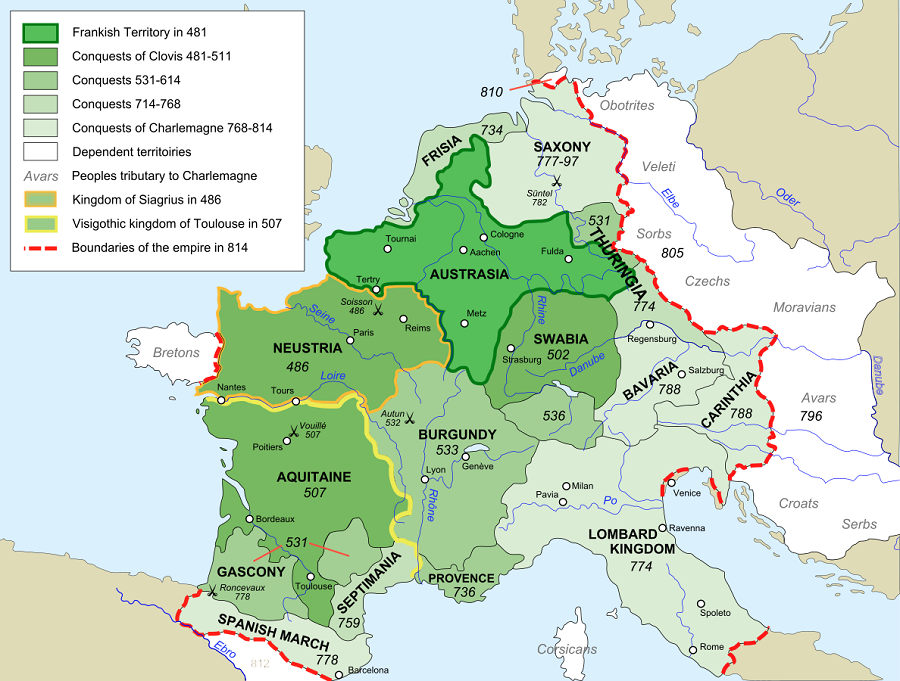In 777, he resolved, says Eginhard, “to go and hold, at the place called Paderborn (close to Saxony) the general assembly of this people.
Continuing Charlemagne,
our selection from A Popular History of France from the EarliestTimes, Volume 1 by François P.G. Guizot published in 1869. For works benefiting from the latest research see the “More information” section at the bottom of these pages. The selection is presented in fourteen easy 5 minute installments.
Previously in Charlemagne.
Time: 777
Place: Northern Germany

CC BY-SA 3.0 image from Wikipedia
Just as the pious zeal of the missionaries was of service to Charlemagne, so did the power of Charlemagne support and sometimes preserve the missionaries. The mob, even in the midst of its passions, is not throughout or at all times inaccessible to fear. The Saxons were not one and the same nation, constantly united in one and the same assembly, and governed by a single chieftain. Three populations of the same race, distinguished by names borrowed from their geographical situation, just as had happened among the Franks in the case of the Austrasians and Neustrians, to wit, Eastphalian or Eastern Saxons, Westphalian or Western, and Angrians, formed the Saxon confederation. And to them was often added a fourth people of the same origin, closer to the Danes, and called North-Albingians, inhabitants of the northern district of the Elbe. These four principal Saxon populations were subdivided into a large number of tribes, who had their own particular chieftains, and who often decided, each for itself, their conduct and their fate. Charlemagne, knowing how to profit by this want of cohesion and unity among his foes, attacked now one and now another of the large Saxon peoplets or the small Saxon tribes, and dealt separately with each of them, according as he found them inclined to submission or resistance. After having, in four or five successive expeditions, gained victories and sustained checks, he thought himself sufficiently advanced in his conquest to put his relations with the Saxons to a grand trial. In 777, he resolved, says Eginhard, “to go and hold, at the place called Paderborn (close to Saxony) the general assembly of this people. On his arrival he found there assembled the senate and people of this perfidious nation, who, conformably to his orders, had repaired thither, seeking to deceive him by a false show of submission and devotion…. They earned their pardon, but on this condition, however, that, if hereafter they broke their engagements, they would be deprived of country and liberty. A great number among them had themselves baptized on this occasion; but it was with far from sincere intentions that they had testified a desire to become Christians.”
There had been absent from this great meeting a Saxon chieftain, called Wittikind, son of Wernekind, King of the Saxons at the north of the Elbe. He had espoused the sister of Siegfried, King of the Danes; and he was the friend of Ratbod, King of the Frisians. A true chieftain at heart as well as by descent, he was made to be the hero of the Saxons just as, seven centuries before, the Cheruscan Herman (Arminius) had been the hero of the Germans. Instead of repairing to Paderborn, Wittikind had left Saxony, and taken refuge with his brother-in-law, the King of the Danes. Thence he encouraged his Saxon compatriots, some to persevere in their resistance, others to repent them of their show of submission. War began again; and Wittikind hastened back to take part in it. In 778 the Saxons advanced as far as the Rhine; but, “not having been able to cross this river,” says Eginhard, “they set themselves to lay waste with fire and sword all the towns and all the villages from the city of Duitz (opposite Cologne) as far as the confluence of the Moselle. The churches as well as the houses were laid in ruins from top to bottom. The enemy, in his frenzy, spared neither age nor sex, wishing to show thereby that he had invaded the territory of the Franks, not for plunder, but for revenge!”
| <—Previous | Master List | Next—> |
More information here and here, and below.
 |
We want to take this site to the next level but we need money to do that. Please contribute directly by signing up at https://www.patreon.com/history
Leave a Reply
You must be logged in to post a comment.